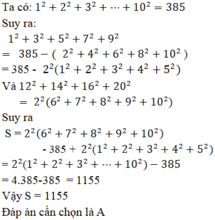
Hãy nhập câu hỏi của bạn vào đây, nếu là tài khoản VIP, bạn sẽ được ưu tiên trả lời.


S = 22 + 42 + 62 + ... + 202
= (2.1)2 + (2.2)2 + (2.3)2 ... (2.10)2
= 22.12 + 22.22 + 22.32 + ... + 22.102
= 22 (12 + 22 + ... + 102 )
= 4 . 385 = 1540

Ta có \(2^2+4^2+...+20^2=2^2\left(1^2+2^2+...+10^2\right)=2^2.385=1540\).

Ta có : \(1^2+2^2+3^2+.....+10^2=385\)
\(\Leftrightarrow2^2\left(1^2+2^2+3^2+.....+10^2\right)=2^2.385\)
\(\Leftrightarrow2^2+4^2+6^2+.....+20^2=4.385\)
\(\Leftrightarrow2^2+4^2+6^2+.....+20^2=1540\)

Ta có 12 + 22 + 32 + …102 = 385
Suy ra ( 12 +22 + 32 +…+102 ) .32 = 385.32
Do đó ta tính được A = 32 + 62 + 92 + …+302 = 3465

a:
Số số hạng trong dãy M là:
(1002-12):10+1=100(số)
=>Sẽ có 50 cặp (1002;992); (982;972);....;(22;12) có hiệu bằng 10
\(M=1002-992+982-972+...+22-12\)
\(=\left(1002-992\right)+\left(982-972\right)+...+\left(22-12\right)\)
\(=10+10+...+10\)
=10*50=500
b: \(N=\left(202+182+...+42+22\right)-\left(192+172+...+32+12\right)\)
\(=\left(202-192\right)+\left(182-172\right)+...+\left(22-12\right)\)
=10+10+...+10
=10*10=100


\(A=\dfrac{1}{3}+\dfrac{1}{3^2}+\dfrac{1}{3^3}+\dfrac{1}{3^4}+...+\dfrac{1}{3^{99}}\)
\(\Rightarrow\dfrac{A}{3}=\dfrac{1}{3^2}+\dfrac{1}{3^3}+\dfrac{1}{3^4}+...+\dfrac{1}{3^{100}}\)
\(\Rightarrow A-\dfrac{A}{3}=\dfrac{2A}{3}=\left(\dfrac{1}{3}+\dfrac{1}{3^2}+\dfrac{1}{3^3}+...+\dfrac{1}{3^{99}}\right)-\left(\dfrac{1}{3^2}+\dfrac{1}{3^3}+\dfrac{1}{3^4}+...+\dfrac{1}{3^{100}}\right)\)
\(\Rightarrow\dfrac{2A}{3}=\left(\dfrac{1}{3^2}-\dfrac{1}{3^2}\right)+\left(\dfrac{1}{3^3}-\dfrac{1}{3^3}\right)+...+\left(\dfrac{1}{3^{99}}-\dfrac{1}{3^{99}}\right)+\left(\dfrac{1}{3}-\dfrac{1}{3^{100}}\right)=\dfrac{1}{3}-\dfrac{1}{3^{100}}\)
\(\Rightarrow2A=3\cdot\left(\dfrac{1}{3}-\dfrac{1}{3^{100}}\right)\)
\(\Rightarrow\text{A}=\dfrac{1-\dfrac{1}{3^{99}}}{2}\)
\(\Rightarrow A=\dfrac{1}{2}-\dfrac{1}{2.3^{99}}< \dfrac{1}{2}\)

Đạt A=2^2+4^2+6^2+...+20^2
A=2^2X(1^2+2^2+3^2+...+10^2) (1)
Mà 1^2+2^2+3^2+...+10^2=385(2)
Thay (2) vào (1), có: A=2^2x385
A=4X385=1540
Vậy 2^2+4^2+6^2+...+20^2 = 1540
A=2^2X(1^2+2^2+3^2+...+10^2) (1)
Mà 1^2+2^2+3^2+...+10^2=385(2)
Thay (2) vào (1), có: A=2^2x385
A=4X385=1540
Vậy 2^2+4^2+6^2+...+20^2 = 1540

Câu hỏi tương tự: Câu hỏi của cát phượng - Toán lớp 7 | Học trực tuyến
S = 22+ 42+...+202
⇔S = 22. (1+22+...+102)
⇔S = 4. 385
⇔S= 1540